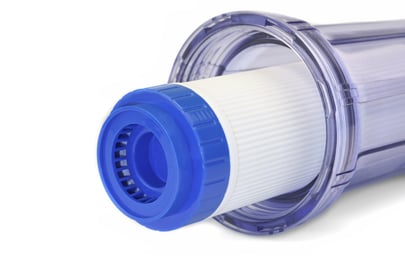
Achieving clean water requires both a quality filtration system and regular maintenance. Knowing how often to change water filter cartridges plays a vital role in keeping water pure, fresh, and safe. Filters that are left unchanged for too long may allow up to 44% of mixed-water systems to fall below required contaminant removal standards, leading to clogged filters, bacteria buildup, and reduced performance that affects taste.
Every filtration system has its own lifespan, influenced by factors such as water quality, system type, and daily use. Whether you manage a large facility or a small household, replacing filters at the right time ensures you continue to enjoy clean water without interruption.
The Role of Water Filters in Maintaining Quality
Water filters capture impurities that can affect taste, odor, and safety. Over time, these impurities build up within the filter, limiting its ability to trap new contaminants.
When that happens, water may flow slower or appear cloudy. This is a sign that the filter has reached its capacity and must be replaced.
Regular filter changes prevent contaminants from bypassing the filtration media. In commercial environments, this step is even more crucial.
Businesses in the hospitality or healthcare industries rely on consistent water quality to meet standards and maintain trust. Clean filters mean reliable performance and protection for everyone who uses the water.
How do I know when a filter needs changing?
Look for reduced water flow, unusual taste or odor, or cloudy water. These are clear signs that your filter has reached capacity.
Why is filter replacement more critical in businesses?
Restaurants, hospitals, and hotels depend on consistent water quality to maintain safety standards and customer trust.
Can a filter be overused before replacing?
Yes. Overused filters become less effective at removing contaminants, which can compromise water safety, taste, and system efficiency.
Typical Replacement Timeframes
The frequency of filter replacement depends on the specific type of system in use. Basic carbon filters typically need to be replaced every six months, while more advanced reverse osmosis or UV systems may require changes every year. Sediment filters often have shorter lifespans due to the amount of debris they trap.
Manufacturers design filters with specific capacities, often measured in gallons of water processed. Once that capacity is reached, the filtration media becomes less effective. Following manufacturer recommendations ensures each component functions properly, protecting the water source and extending the life of your equipment.
Factors That Affect Filter Lifespan
Several elements influence how long a filter lasts. Water quality is one of the biggest factors.
- Reduced flow or pressure: Water may flow slower, indicating a clogged filter.
- Unusual taste or odor: Metallic or off flavors suggest the filter is no longer effectively removing contaminants.
- Cloudy or discolored water: Visible particles indicate the filter has reached its capacity.
- Increased maintenance needs: Equipment may require more frequent repairs if the filter is not functioning.
- Impact on compliance or customer perception: In commercial settings, poor water quality can affect health standards or client trust.
Signs That It’s Time to Change Your Filter
Changes in flow or pressure, unusual taste, or metallic odor often indicate a clogged filter. If you notice cloudy water or an increase in particles, the filter may no longer be functioning effectively.
In workplaces, such issues can also affect customer perception and compliance with safety standards. For homes, it may mean your drinking water no longer meets health expectations. Keeping a maintenance schedule and monitoring performance helps prevent problems before they escalate.
Why Regular Maintenance Saves Time and Cost
- Reduce long-term costs: Regular filter changes prevent damage to internal components and plumbing systems.
- Maintain system efficiency: Blocked filters force pumps and pipes to work harder, increasing energy usage and operational expenses.
- Extend equipment life: A consistent maintenance routine keeps performance stable, lowers repair needs, and preserves water purity.
- Cost-effective protection: Regular filter replacement is one of the most efficient ways to maintain both water quality and equipment integrity.
- Expert guidance and solutions: At Pure n Natural Systems, we provide commercial and home filtration systems with straightforward maintenance schedules tailored to offices, restaurants, factories, and homes.
- Health and compliance benefits: Trusted equipment and professional advice help clients protect health, meet compliance standards, and enjoy reliable water quality without guesswork.
Clean Water Starts with Consistent Care
Clean, refreshing water depends on more than just good equipment; it requires attention and timely maintenance. Changing filters on schedule ensures your system continues performing as designed and that the water you drink, cook with, or use in your business stays safe. Neglecting this small step can lead to costly repairs or compromised health standards.
Protect your investment and enjoy better water every day. Contact us to learn more about filter replacement schedules and reliable filtration products designed to keep your water pure. Our experts are here to help you maintain consistent quality, performance, and peace of mind.


